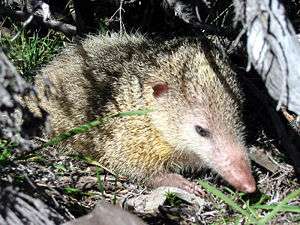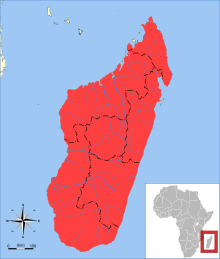Tailless tenrec
The tailless tenrec (Tenrec ecaudatus), also known as the common tenrec, is a species of mammal in the family Tenrecidae. It is the only member of the genus Tenrec. Native to Madagascar, it is also found in the Comoros, Mauritius, Réunion, and Seychelles, where it has been introduced.[2] Its natural habitats are subtropical or tropical dry forest, subtropical or tropical moist lowland forest, subtropical or tropical moist montane forest, dry savanna, moist savanna, subtropical or tropical dry shrubland, subtropical or tropical moist shrubland, subtropical or tropical high-altitude shrubland, subtropical or tropical dry lowland grassland, subtropical or tropical high-altitude grassland, arable land, pastureland, plantations, rural gardens, and urban areas.[2]
| Tailless tenrec[1] | |
|---|---|
 | |
| Scientific classification | |
| Kingdom: | Animalia |
| Phylum: | Chordata |
| Class: | Mammalia |
| Order: | Afrosoricida |
| Suborder: | Tenrecomorpha |
| Family: | Tenrecidae |
| Subfamily: | Tenrecinae |
| Genus: | Tenrec Lacépède, 1799 |
| Species: | T. ecaudatus |
| Binomial name | |
| Tenrec ecaudatus (Schreber, 1778) | |
 | |
| Tailless tenrec range | |
The tailless tenrec is the largest species of the tenrec family, Tenrecidae. It is 26 to 39 cm (10 to 15½ in) in length and weighs up to 2 kilograms (4.4 lb).[2] It has medium-sized, coarse grey to reddish-grey fur and long, sharp spines along its body. It not only eats small invertebrates and animals such as frogs and mice, it also eats leaves. If threatened, this tenrec will scream, erect its spiny hairs to a crest, jump, buck and bite. It shelters in a nest of grass and leaves under a rock, log or bush by day. It gives birth to a litter of as many as 32 young, with an average litter between 15-20 after a gestation of 50–60 days; when young, they have a black-and-white striped appearance. Despite being sometimes known as the tailless tenrec, they have a small tail 1 to 1.5 cm (⅜ to ½ in) in length.
The tenrec is the first known tropical mammal found to hibernate for long stretches without arousal periods, up to nine months at a time.[3] The Tailless tenrec is a host of the Acanthocephalan intestinal parasite Promoniliformis ovocristatus.[4]
References
- Bronner, G.N.; Jenkins, P.D. (2005). "Order Afrosoricida". In Wilson, D.E.; Reeder, D.M (eds.). Mammal Species of the World: A Taxonomic and Geographic Reference (3rd ed.). Johns Hopkins University Press. p. 77. ISBN 978-0-8018-8221-0. OCLC 62265494.
- Stephenson, P.J.; Soarimalala, V.; Goodman, S. (2016). "Tenrec ecaudatus". IUCN Red List of Threatened Species. IUCN. 2016: e.T40595A97204107. doi:10.2305/IUCN.UK.2016-1.RLTS.T40595A97204107.en. Retrieved 2 February 2019.CS1 maint: uses authors parameter (link)
- Gruber, K. G. (23 October 2014). "Mammals may have slept through dinosaur extinction". Australian Geographic. Retrieved 2019-02-02.
- Dollfus, Robert-Ph.; Golvan, Yves-J. (1963). "Sur un singulier Métacanthocéphale parasite d'insectivores (Tenrecinae) de Madagascar et des Comores" (PDF). Annales de Parasitologie Humaine et Comparée. 38 (5): 793–806. doi:10.1051/parasite/1963385793. Retrieved February 9, 2020.
| Wikimedia Commons has media related to Tenrec ecaudatus. |
| Wikispecies has information related to Tenrec ecaudatus |
